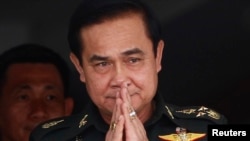The army chief who deposed Thailand’s civilian government three months ago has been selected as the kingdom’s prime minister. General Prayuth Chan-ocha was the only candidate nominated for the job.
A handpicked legislature stacked with military officers held a vote Thursday to select the country’s prime minister.
One by one, all of the appointed legislators were called on by name. They stood and verbally endorsed the nomination of the only candidate: army General Prayuth Chan-ocha.
A few minutes later, after 191 legislators voted, the assembly’s president, Pornpetch Wichitcholchai, declared “the name of General Prayuth Chan-ocha as elected prime minister is accepted and proposed” for royal endorsement.
The approval by the frail 86-year-old King Bhumibol Adulyadej is seen as a formality and expected within a week.
The general did not attend the legislative session. He was at a military base for a ceremony marking the anniversary of an infantry regiment.
Criticism of the authoritarian process to select a new government leader is muted in Thailand. Martial law remains in effect. No public demonstrations are permitted. The domestic media operates under the scrutiny of the military.
But Thai critics abroad, some of whom are now considered fugitives by the junta, as well as anonymous commentators on social media are decrying the process. Some made humorous comparisons between the current government structure in Thailand and that of North Korea, where a single political party and a rubber stamp legislature have always been the rule.
An associate professor at Kyoto University’s Center for Southeast Asian Studies, Pavin Chachavalpongpun, said such an analogy should be taken seriously.
“I don't think this is a joke. There are so many points that can be compared between the two countries, especially some kind of political absurdities, people living in their own political fantasy. It's just too good to be true, it's too surreal,” said Pavin.
General Prayuth deposed the government on May 22, arguing it was necessary to end the political turmoil following six months of dueling and sometimes deadly street rallies.
The army chief has previously announced a comprehensive plan to reform Thai politics and “return happiness to the people.” A military officer with the junta, officially known as the National Council for Peace and Order, told VOA News shortly after the coup that one of its primary goals is to permanently eradicate the influence of Thaksin Shinawatra, who was ousted as prime minister in a coup in 2006. Parties he has backed have won every national election since 2001.
General and now prime minister-elect Prayuth is scheduled to retire as army chief next month at age 60. He has promised national elections following political reform, a process he has said would take at least one year to complete.
Pavin, based in Japan and whose Thai passport has been revoked by the junta for failing to return home for questioning, contends the army chief has harbored a desire for the prime minister’s job.
“This is not about returning power to the Thai people. This is not about reforming Thai politics. It's not about trying to look for a date of elections. But indeed this is a part of entrenching the military power in politics in order to make sure that they could come up with a certain kind of political mechanism that would prevent a Thaksin proxy to come back,” said Pavin.
Since the coup, General Prayuth has appeared in uniform, each week, to address the nation at length on television, covering a wide range of topics. No subject seems too minor to be noted by the junta boss, who has spoken about the need to clean storm water drain pipes and admonished taxi drivers who overcharge tourists.
Thailand’s civilian governments, since the end of the absolute monarchy in 1932, have frequently been pushed aside by generals.
The U.S. Embassy in Bangkok said it "takes note" of the latest development and the United States hopes it is "a step in a process that leads to a freely and fairly elected civilian government."
The Embassy's e-mailed statement adds that "we urge the interim government, once formed, to institute a truly inclusive reform process that reflects the broad diversity of views within the country. We remain concerned about continuing limitations on free speech and assembly. We call upon the interim prime minister and cabinet to end restrictions on free speech and assembly, as well as to lift martial law and press restrictions."
General Prayuth’s coup has been condemned by many Western governments. Thailand's internal turmoil appears to have had an impact on the country’s economy, the second largest in Southeast Asia, which shrank in the first half of this year. Thailand, a popular holiday destination, has suffered a ten percent drop in the number of foreign tourists this year. But many Thais say they feel more secure now that the bloodless coup put an end to the sometimes violent demonstrations.





